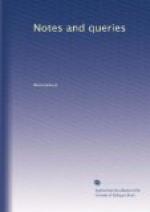[Greek: “Ta taes
manteias hae mallon manias ephtheggeto
hraemata.”]
In another place of Plutarch (tom. ii., p. 414. E.) we have [Greek: eggastrimuthoi] and [Greek: puthones] used as synonymous words to express persons into whose bodies the god might be supposed to enter, “using their {235} bodies and voices as instruments.” The only word in that passage which appears to hint at what we call ventriloquism is [Greek: hupophtheggesthai].
I have very little doubt that amongst the various tricks of ancient divination ventriloquism found a place; but I cannot give that direct evidence which MR. SANSOM asks for. I think it very likely that “the wizards that peep and mutter” (Isa. viii. 19.) were of this class; but it is not clear that the [Hebrew: ’obot]—the [Greek eggastrimuthoi] of the LXX.—were so. The English version has “them that have familiar spirits.” The Hebrew word signifies bottles; and this may mean no more than that the spirit of divination was contained in the person’s body as in a bottle, “using his body and his voice as instruments,” as in the place of Plutarch quoted above. We have something like this, Acts, xix. 15., where “the evil spirit answered,” no doubt in the voice of the demoniac, “Jesus I know,” &c. Michaelis (Suppl., p. 39.) gives a different meaning and etymology to [Hebrew: ’obot]. He derives it from the Arabic, which signifies (1) rediit, (2) occidit sol, (3) noctu venit or noctu aliquid fecit. The first and third of these meanings will make it applicable to the [Greek: nekromanteia] (of which the witch of Endor was a practitioner), which was carried on at night. See Hor. Sat. I. ix.
I do not think that the damsel mentioned Acts, xvi. 16. was a ventriloquist. The use of the word [Greek: ekraze] in the next verse, would lead us to infer that she spoke in a loud voice with her mouth open; whereas the [Greek: eggastrimuthoi] are defined by Galen (Glossar. Hippocr.) as [Greek: oi kekleismenou tou stomatos phthengomenoi].
Consult Vitringa and Rosenmueller on Isa. viii. 19., Wolf and Kuinoel on Acts, xvi. 16., Biscoe on the Acts, ch. viii. Sec.2; where references will be found to many works which will satisfy Mr. SANSOM better than this meagre note.
[Hebrew: B]
Ventriloquism (Vol. ii., p. 88.).—In reply to Query 1, I wish to call Mr. SANSOM’S attention to Plutarch de Oraculorum defectu (Lipsiae, 1777, vol. vii. p. 632.), and to Webster’s Displaying of supposed Witchcraft (chaps. vi. and viii.). Queries 2 and 3. Besides the extraordinary work of Webster, he may consult the elaborate dissertations of Allatius on these subjects, in the eighth volume of Critici Sacri. Query 4. On the use of the term [Greek: eggastrimuthos] by the sacred writers, Ravanelli Biblioth. S., and by classical authors, Foesii Oeconomia Hippocratis; and for synonymous “divinorum ministrorum nomina,” Pollucis Onomasticon.




